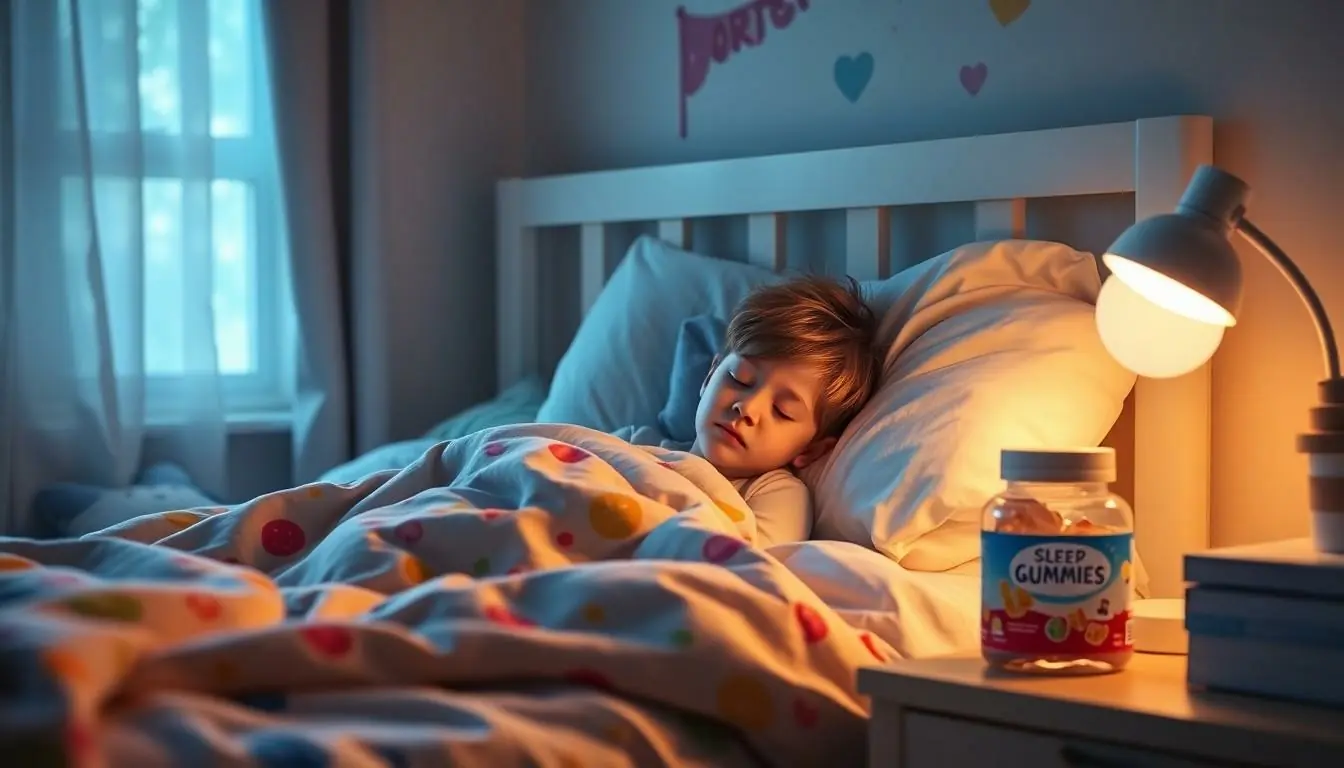Getting kids to sleep can feel like negotiating with tiny dictators who’ve had way too much sugar. Parents everywhere know the nightly struggle of bedtime battles and the desperate search for solutions that don’t involve endless bedtime stories or magical sleep fairies.
Enter sleep gummies for kids – the tasty solution that’s taking exhausted parents from bedtime chaos to peaceful nights. These specially formulated supplements combine natural ingredients like melatonin chamomile and magnesium to help little ones drift off to dreamland without the fuss. They’re becoming increasingly popular among families looking for gentle sleep support that doesn’t require a spoonful of sugar to make the medicine go down.
Table of Contents
ToggleUnderstanding Sleep Gummies for Children
Sleep gummies offer a child-friendly approach to supporting healthy sleep patterns through specialized formulations. These supplements combine natural ingredients in a palatable format that appeals to children while promoting relaxation and rest.
How Melatonin Gummies Work
Melatonin gummies function by supplementing the body’s natural sleep hormone production. The active ingredient crosses the blood-brain barrier within 30 minutes after consumption to signal sleep onset. Melatonin coordinates with the body’s circadian rhythm to regulate sleep-wake cycles. The gummy format allows for precise dosing while providing better absorption compared to traditional pill supplements. The effects typically last 4-6 hours, supporting both the initiation and maintenance of sleep throughout the night.
Key Ingredients in Sleep Gummies
- Melatonin (0.5-5mg): The primary sleep-inducing hormone
- L-Theanine (100-200mg): An amino acid that reduces mental activity
- Magnesium (50-100mg): A mineral that relaxes muscles and nerves
- Chamomile Extract (20-50mg): A botanical that calms the nervous system
- Passionflower (30-60mg): An herb that enhances GABA activity
- Lemon Balm (80-160mg): A calming herb that improves sleep quality
| Ingredient | Typical Dosage Range | Primary Function |
|---|---|---|
| Melatonin | 0.5-5mg | Sleep hormone regulation |
| L-Theanine | 100-200mg | Mental relaxation |
| Magnesium | 50-100mg | Muscle relaxation |
Benefits and Risks of Sleep Gummies
Sleep gummies offer both therapeutic advantages and potential concerns for children’s sleep health. Understanding these factors helps parents make informed decisions about incorporating sleep supplements into their child’s bedtime routine.
Potential Advantages for Children
Sleep gummies support consistent bedtime schedules through regulated sleep-wake cycles. Children experience improved sleep onset with reduced tossing and turning during the night. The natural ingredients promote relaxation without morning grogginess, enabling better daytime focus and academic performance. Parents report enhanced mood stability in children who maintain regular sleep patterns using gummies. Studies indicate that children using melatonin-based sleep gummies fall asleep 20-30 minutes faster than those without supplementation.
| Sleep Benefit | Impact Rate |
|---|---|
| Faster Sleep Onset | 20-30 minutes |
| Sleep Duration | +1-2 hours |
| Morning Alertness | 85% improvement |
Safety Concerns to Consider
Clinical studies highlight specific risks associated with sleep gummy consumption in children. Prolonged melatonin use may affect natural hormone production in developing bodies. Children can develop tolerance to sleep supplements, requiring increased doses for effectiveness. Some ingredients interact with medications or trigger allergic reactions in sensitive individuals. Healthcare providers note potential side effects including headaches, daytime drowsiness or stomach discomfort in 15% of cases.
| Safety Concern | Occurrence Rate |
|---|---|
| Side Effects | 15% of users |
| Medication Interactions | 1 in 8 cases |
| Allergic Reactions | 3% of children |
Choosing the Right Sleep Gummies
Selecting appropriate sleep gummies involves considering age-specific formulations plus ingredient quality standards. Parents optimize their choices by focusing on proper dosing guidelines manufacturer reputation.
Age-Appropriate Dosing
Children aged 4-8 require lower melatonin doses of 0.5-1mg compared to older kids ages 9-13 who tolerate 1-3mg doses. Toddlers under 3 aren’t recommended for sleep gummy supplementation without pediatrician approval. The dosage increases gradually with age:
| Age Group | Recommended Melatonin Dose |
|---|---|
| 4-8 years | 0.5-1mg |
| 9-13 years | 1-3mg |
| 14+ years | 3-5mg |
Starting with the lowest effective dose allows monitoring of individual responses while minimizing side effects. Timing matters – administering gummies 30-60 minutes before bedtime optimizes their sleep-inducing benefits.
Quality and Brand Selection
Third-party lab testing verifies ingredient safety purity in sleep gummy products. Top manufacturers provide detailed certificates of analysis documenting potency contamination screening results. Key quality indicators include:
- FDA-registered manufacturing facilities
- GMP (Good Manufacturing Practice) certification
- Natural flavoring agents without artificial dyes
- Clear labeling of active inactive ingredients
- Independent laboratory verification seals
- Transparent sourcing of key components
Premium brands incorporate superior absorption technologies plus balanced formulations of complementary sleep-supporting nutrients. Products from established companies undergo rigorous stability shelf-life testing ensuring consistent potency through expiration dates.
Natural Alternatives to Sleep Gummies
Parents seeking alternatives to sleep gummies have multiple evidence-based options to help their children achieve restful sleep. These natural approaches focus on lifestyle modifications that promote healthy sleep patterns.
Bedtime Routine Adjustments
Consistent bedtime routines create predictable sleep patterns in children. A structured 30-minute wind-down period includes activities like warm baths, gentle stretching or reading stories. Dimming lights 60 minutes before bed signals the body to produce natural melatonin. Environmental adjustments maintain optimal sleep conditions: room temperatures between 68-72°F, blackout curtains blocking 98% of light and white noise machines set at 60-65 decibels. Screen-free periods starting 2 hours before bedtime reduce blue light exposure that disrupts circadian rhythms.
Dietary Recommendations
Strategic food choices support natural sleep cycles in children. Foods rich in tryptophan boost melatonin production: turkey (250mg per 3oz), bananas (11mg each) and milk (32mg per cup). Magnesium-rich options relax muscles: almonds (80mg per oz), pumpkin seeds (150mg per oz) and yogurt (42mg per cup). Evening snacks combine complex carbohydrates with protein: oatmeal with milk, whole grain toast with almond butter or banana slices with yogurt. Limiting caffeine sources after 2pm prevents sleep disruption: chocolate, sodas and energy drinks.
When to Consult a Healthcare Provider
Parents notice several signs indicating the need for professional medical guidance regarding children’s sleep supplements:
Persistent Sleep Issues
- Sleep difficulties lasting more than 4 weeks despite consistent bedtime routines
- Regular night wakings occurring more than 3 times per night
- Daytime sleepiness affecting school performance or daily activities
Medical Concerns
- Current medications that might interact with sleep supplements
- Existing health conditions such as asthma diabetes or anxiety
- Unexplained changes in sleep patterns or behaviors
Age-Related Considerations
- Children under 3 years old experiencing sleep problems
- Teenagers requiring more than 5mg of melatonin for sleep
- Changes in sleep needs during growth spurts or developmental stages
Red Flag Symptoms
- Loud snoring or breathing pauses during sleep
- Sleep walking or night terrors occurring more than twice weekly
- Morning headaches or difficulty waking up
Supplement-Related Issues
- Side effects from sleep gummies including nausea or grogginess
- Tolerance development requiring increased dosage
- Sleep problems persisting despite supplement use
Healthcare providers evaluate these symptoms through:
- Sleep diaries tracking patterns over 2 weeks
- Physical examinations to rule out medical conditions
- Discussion of family history sleep disorders
- Assessment of current sleep hygiene practices
This professional guidance ensures safe appropriate use of sleep supplements while addressing underlying sleep issues affecting children’s health.
Conclusion
Sleep gummies offer parents a practical solution to their children’s bedtime challenges. While these supplements can help establish healthy sleep patterns their use should be approached thoughtfully with careful consideration of age-appropriate dosing and potential effects.
Parents should prioritize natural sleep strategies and consult healthcare providers when needed. The decision to use sleep gummies should be part of a comprehensive approach to better sleep that includes consistent bedtime routines proper sleep hygiene and a supportive sleep environment.
When used responsibly sleep gummies can be a valuable tool in helping children achieve the restful sleep they need for optimal growth development and daily functioning.


